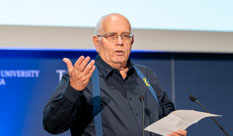More:
Events
The European Union (EU) "Tempus Seminar"
"Tempus" is a new program by the European Union to support the modernization of higher education and to increase the collaboration between the EU and the partner states. This program finances projects intended to promote higher-education reforms (e.g., 'internationality' in higher education; student mobility; studies in English language; strengthening connections between academia and industry; academia-community ties, etc.).
HIT hosted the seminar participants, ca. 50 higher-education experts from several EU member states and other partner states, from the Union's center in Brussels and from Israel.
The honor guests of the seminar were: Prof. Daniel Hershkowitz, Minister of Science and Technology; Mr. Andrew Standley, EU Ambassador in Israel; Mr. Ilan Peled, Director of the Magnet Program at the Chief Scientist's Office at the Israel Ministry of Industry, Commerce and Employment; Prof. Jacob Ziv, former President of the Israeli Science Academy and two-time winner of the Israel Award in Exact Sciences; Mr. Klaus Haupt, Head of the Tempus Unit in the EU; and Mr. Jacques Kemp, Tempus Program Coordinator in the EU-member Central Asian states.
The seminar, which took place at HIT, Holon Institute of Technology, was dedicated to the discussion of the following subject: 'Academy-Industry Cooperation' and included lectures both by academics and by industrial experts from Israel and abroad, who presented successful partnerships and collaborations.
 |
 |
|
Minister of Science, Daniel Hershkowitz, and HIT's President Gadi Golan |
The "Fuel of the Tomorrow" Convention |
The list of topics discussed:
-
What successful models exist that connect traditional industry, hi-tech industry and academia?
-
Which collaborative projects failed and which succeeded, and why?
-
How essential is the cooperation between academia and industry?
-
What potential solutions for the financial problems of start-ups stem from academic research?
-
Is the Israel Chief Scientist's support model sufficient to meet global standards? What is its uniqueness and what are its advantages?
What is the difference between academia-industry collaboration in Western states and in Third World countries?
During this seminar, the guests visited the Design Museum, the "SolarEdge" Company and the Weitzman Institute of Science, where they heard a lecture by Prof. Mordechai Sheves, Vice-President for Technological Implementations at Weizmann Institute, on the subject: "Technology Transfer." Then, the guests visited the Science Park in Rehovot and toured the Institute's Campus, design workshops, laboratories and classes, and had a festive meal at the "Benny Hadayag" Restaurant in Tel Aviv.
Prof. Gadi Golan, HIT's President, described, for the guests, the various activities of the Institute's research groups, offering a combination between academic research and industrial implementation. He highlighted the importance of education for practical science in Israeli society and the goals of training the younger generation of future engineers and managers, so they might nurture new ideas and turn academic research into economic, security and social developments.
- News & Events
New Collaboration with Sheba Medical Center will qualify nurses to work in a digital environment.
Collaboration between HIT Holon Institute of Technology, the teaching authority of the Sheba Medical Center, and the Sheba-BEYOND virtual hospital will allow training nurses in Israel and around the world to work in a digital...



 Additional programs
Additional programs
